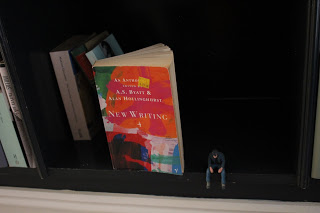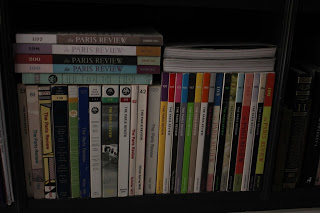 This is an anthology of (mainly) British writing (edited by A. S. Byatt and Alan Hollinghurst) that I bought at a sale in 1995, and didn’t read. For obvious reasons. I mean, it’s an anthology of (mainly) British writing. Give me a break!
This is an anthology of (mainly) British writing (edited by A. S. Byatt and Alan Hollinghurst) that I bought at a sale in 1995, and didn’t read. For obvious reasons. I mean, it’s an anthology of (mainly) British writing. Give me a break!
This isn’t a “best of” anthology, or anything. Apparently the editors just invited a bunch of people to submit stories, poems and excerpts from their upcoming novels, and then they sent it off to the printers. That’s certainly what it reads like.
It’s not that there isn’t good stuff in here. It’s just that there’s enough mediocre stuff in here that I started approaching every new text with suspicion. “Is this going to suck? I’ve read two pages now, and it’s not any good yet. Should I ditch it? Carry on?”
Losing faith in an anthology makes for a very unsatisfactory reading experience.
Which reminds me of an anthology I have the utmost confidence in: The Paris Review. I started picking it up on a whim like a decade ago. I was intrigued by its “silence”. There’s no introduction from an editor at the start. Each contributor has a note in the back, but these are so short as to be more mystifying than enlightening (i.e., “*** has published several novels”, “*** was born in 1953”, and that’s it, sometimes).
There’s just the texts, and they range from pretty good to absofuckinglutely wonderful. Ok, sometimes they’re a bit on the pretentious side, but I don’t mind that. I don’t want everything to be a flippant McSweeney’s thing, although I like that, too.
The mixture of short stories, poetry, art “folios”, the occational reportage and the always-enlightening author interviews (“What kind of pencil do you usually write with? Do you write mostly in the morning or the evening?”) creates a perfect alchemical mixture that’s very satisfying. I mostly read The Paris Review while travelling, which may also have something to do with my appreciation of the publication.
Anyway, back to New Writing 4. Like I said, there is good stuff in here. The hilarious Labels by Louis de Bernières. The ambiguously optimistic A Geographer by Philip Hensher. The heartbreaking A Day by William Trevor.
But there’s way too much meh here.
You know that old question about what an editor does for a living? The answer is: Not work here.
Rating: Unevenicious
